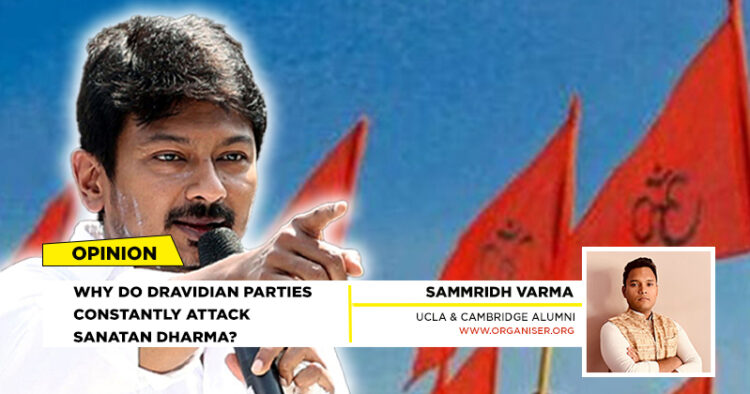“Sanatan Dharma has to be eradicated just like mosquitoes, malaria, dengue, and Corona”. This isn’t quoted from any LeT, ISIS Khorasan terrorists, or Mughal invaders, but a recent statement from the son of Tamil Nadu Chief Minister MK Stalin, Udhayanidhi Stalin. The third-generation DMK scion doubled down on his vicious statement and acknowledged his readiness to face any legal action. This comes before the upcoming State elections, which have remained under the rule of Dravidian parties for the last 50 years.
Dravidian parties, particularly in Tamil Nadu, have a historical precedent of opposing Sanatan Dharma. But what drives this agenda? Let’s dive in
Historical and political context
Since their inception, the DMK and AIADMK have deeply embedded “Dravidian Identity Politics” into their political narrative. Initially, their focus was on anti-Brahmin politics, which later evolved into a broader opposition against Sanatan Dharma. Their claim is a fight against what they perceive as the alleged Brahmanical domination of an age-old tradition in the face of evolving global cultural dynamics. This, they argue, is to challenge the world’s only surviving native culture amidst the rise of Abrahamic religions.
Interestingly, their stance holds a certain irony. The term “Dravida”, which forms the basis of their identity politics, was actually coined by Adi Shankaracharya, a significant figure in Sanatan Dharma. He, during his travels in Mandhata, referred to himself as a “Drāviḍa Śiśu” (a child of Dravida’), indicating his origin. The term drāviḍa is derived from the Sanskrit words dravya (meaning ‘water’) and vida (meaning ‘meeting place’), signifying “the place where the three waters meet”, referring to the confluence of the Indian Ocean, the Arabian Sea, and the Bay of Bengal.
While one must accept the development work done in Tamil Nadu under these neo-Dravidian parties in the past, we cannot oversee the misgovernance inflicted on the State in recent times. The genetic study from Bharatdebunks the Aryan-Dravidian dissection, but these political parties continue to push the foreign propaganda, discarding any Indian analysis or science for that matter. Power, Media, and Influence: The Dravidian parties wield considerable power in Tamil Nadu. Their influence isn’t limited to politics; it extends to the media, cinema, and cultural domains. With figures like Karunanidhi’s wife, MK Dayalu, owning a significant share in Kalaignar TV and Kalanithi Maran owning the Sun group, their reach is extensive. This dominance often gets channelled to amplify regionalism and linguistic divides and promote sentiments against the residents of the northern part of India and the followers of Sanatan Dharma.
Contrasting Ideologies
Periyar vs. Ambedkar Udhayanidhi Stalin referred to Dr BR Ambedkar and Periyar as the basis of his rhetoric, but a quick comparison unveils the reason why neo-Dravidian politics is anti-Sanatan Dharma. EV Ramasamy, a Kannada-speaking Naicker who settled in Tamil Nadu, and Dr BR Ambedkar were both colossal figures in India’s socio-political domain. However, their ideologies starkly contrasted. Periyar believed strongly in the Aryan-Dravidian divide and promoted racial theories, while Dr Ambedkar was a staunch humanist who dismissed the Aryan race theory, emphasising that race had little bearing on India’s social dynamics. Periyar leaned towards monotheism, believing in the superiority of colonial imperialism, while Dr Ambedkar saw the Hindu concept of Brahman as foundational for democracy. Periyar was critical of democracy, considering it the root of societal issues, whereas Ambedkar championed it, linking it to liberty, equality, and fraternity. Furthermore, Periyar was perceived as anti-Indian, advocating for the balkanisation of India based on linguistic and racial lines, while Ambedkar stood firm on India’s cultural unity. Periyar had disdain for Sanskrit and what he associated with Brahmins, while Dr Ambedkar regarded Sanskrit as a treasured language and saw value in the Upanishads. Additionally, Periyar had controversial views on Dalits, whereas Dr Ambedkar, himself a Dalit, worked tirelessly for their rights and upliftment. These contrasts illuminate the profound differences in their beliefs and approaches to social reform. Apparently, Periyar’s politics has always been one of hypocrisy and hatred, aimed at ravishing the ancient civilisation of our nation on the lines of Abrahamic invasions that have pitted Bharatiyas against each other and Bharat at large.
An alleged shield for malpractices
In a notable development, Justice N. Anand Venkatesh of the Madras High Court has acted suo motu, revising the acquittal and discharge decisions of three senior DMK ministers of the Tamil Nadu government. Those affected are Education Minister K. Ponmudi, Revenue Minister KKSSR Ramachandran, and Finance Minister Thangam Thennarasu, whose corruption cases were previously decided by Special Courts. Additionally, a 2012 discharge order involving former Tamil Nadu Chief Minister O Panneerselvam of the AIADMK was also re-evaluated. The DMK has faced scrutiny recently, with allegations of corruption in the Dwarka Motorway project based on a CAG report and malpractice within the Ayushman Bharat scheme. Chief Minister MK Stalin has, however, publicly supported Minister V Senthil Balaji, who is currently incarcerated over accusations of involvement in a cash-for-jobs scandal and money laundering. Moreover, the DMK is implicated in allegations of smuggling minerals from Tamil Nadu to Kerala. High-profile cases, such as the M-Sand scam valued at Rs 1,000 crore, continue to remain unproven.
Tamil Nadu needs more than an electoral solution
The antagonistic stance of neo-Dravidian parties towards Sanatan Dharma seems to be a blend of political strategy, historical narratives, and the need to consolidate power. While their criticisms and policies might resonate with a segment of their voter base, it’s essential to analyse their statements and actions within the broader socio-political context of Tamil Nadu and Bharat. These dastardly acts of propelling genocidal sentiments against the already suffering Hindus must be dealt with sturdily, or else they will do irreparable damage to the consciousness of this nation.



















Comments